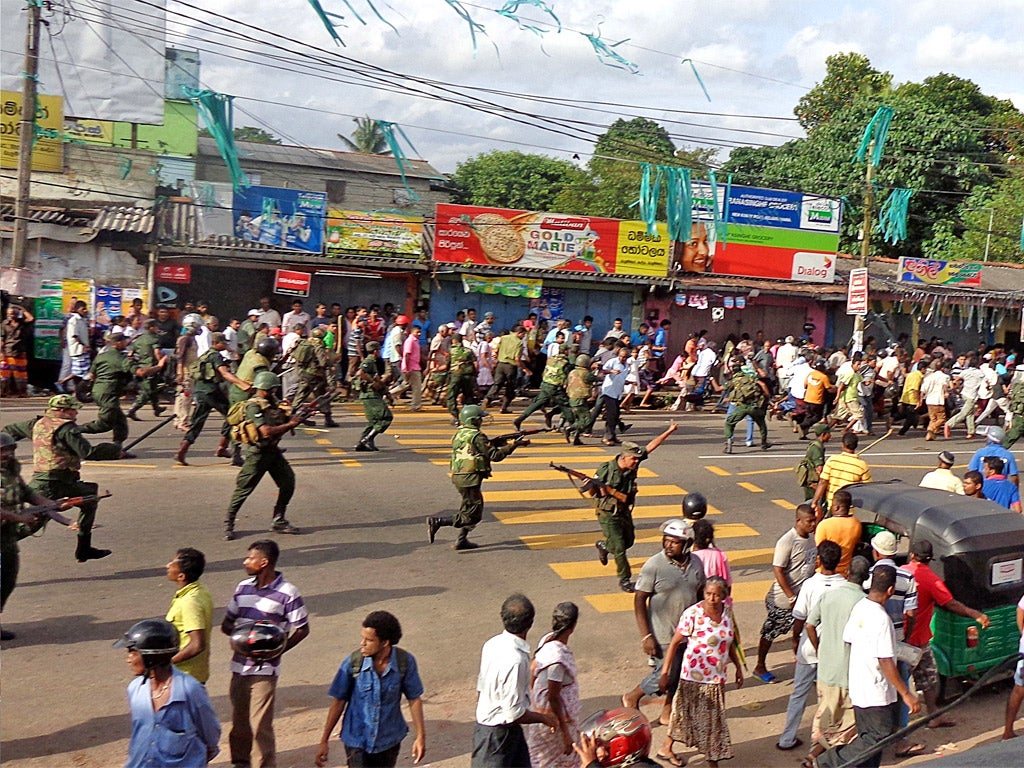The Independent's journalism is supported by our readers. When you purchase through links on our site, we may earn commission.
Sri Lanka provides the argument for disbanding the Commonwealth
The country has no business hosting an event meant to promote human rights

Your support helps us to tell the story
From reproductive rights to climate change to Big Tech, The Independent is on the ground when the story is developing. Whether it's investigating the financials of Elon Musk's pro-Trump PAC or producing our latest documentary, 'The A Word', which shines a light on the American women fighting for reproductive rights, we know how important it is to parse out the facts from the messaging.
At such a critical moment in US history, we need reporters on the ground. Your donation allows us to keep sending journalists to speak to both sides of the story.
The Independent is trusted by Americans across the entire political spectrum. And unlike many other quality news outlets, we choose not to lock Americans out of our reporting and analysis with paywalls. We believe quality journalism should be available to everyone, paid for by those who can afford it.
Your support makes all the difference.Next week Sri Lanka will host Commonwealth Heads of Government Meet (CHOGM), apparently the first Asian country to host it in 24 years. According to its charter, the Commonwealth is committed to the Universal Declaration of Human Rights and other relevant human rights covenants and international instruments.
The host state, however, has abysmal records on human rights: military backed rape and killing, and the continued forced-disappearance of its own citizens even after the violent ending of 27 years of conflict when 40,000 civilians were murdered. Sri Lanka does not have any moral standing to host any event that is supposed to promote and restore human rights and democracy.
The United Nations High Commissioner for Human Rights Ms. Navi Pillai in her press conference in Colombo said that Liberation Tigers of Tamil Ealam (LTTE) was a murderous organisation and then expressed serious concerns about Sri Lankan government’s militarisation of civil zones in the name of post-war development; worried about the increased vulnerability of women and girls, especially female headed households to sexual harassment and abuse and the forced disappearance of many civilians not only in the North-East provinces and but also abductions in white vans in Colombo which will not fall within the scope of Commission of Inquiry on Disappearances.
Ms. Pillai also said, "more than 30 journalists are believed to have been killed since 2005, and several more – including the cartoonist Prageeth Ekneligoda – have disappeared."
The Commonwealth Ministerial Action Group (CMAG) which is responsible for the restoration of democracy, human rights and constitutional rule of its member-states, has turned a blind eye to Sri Lanka’s horrible human rights violations, despite comprehensive evidence mounting from UN and from the media.
Understandably, human rights groups around the world and sympathisers particularly from India (home to 70 million Tamil population) have raised strong objections. The Tamil Nadu State Assembly recently passed a resolution demanding that India completely boycott CHOGM.
Indian foreign policy is not critical of its neighbouring state and it does not exactly have a stellar record of restoring human rights in its own country when it comes to issues related to Kashmir and Maoists. India also wants to stay with Sri Lanka for geo-political reasons as the host-state has recently cosied up with China.
Australia is also keen to do business with Asian countries and not bothered with human rights issues to wreck its trade focus.
This means the business and politics of member-states are hardly influenced by the so-called Charter of the Commonwealth even though a sizeable population of Sri Lankan Tamils have resettled into some of these member-countries as refugees. Neither member-states nor the CMAG take the charter seriously, except in select situations when African members were taken to task to wash the empire’s colonial guilt.
So far, Canada is the only country that has officially boycotted and its Prime Minister Stephen Harper questioned the relevance of the Commonwealth if a member-state like Sri Lanka continues to violate human rights.
The Commonwealth’s human rights wing, Commonwealth Human Rights Initiative, has consistently counselled the Secretary General against allowing the CHOGM to be hosted by Sri Lanka. Its latest press release expressed "continued concerns regarding the holding of the CHOGM...and the fact that Sri Lanka will take over as the Chair of the Commonwealth of the next two years."
With this, the Commonwealth loses its moral right to exist. To allow a rogue state like Sri Lanka to enjoy a dubious legitimacy through a dubious endorsement only pushes the point home.
More on this here: http://www.independent.co.uk/voices/comment/i-only-watched-no-fire-zone-by-chance-but-its-revelations-about-sri-lanka-are-surely-unmissable-8921398.html
Join our commenting forum
Join thought-provoking conversations, follow other Independent readers and see their replies
Comments